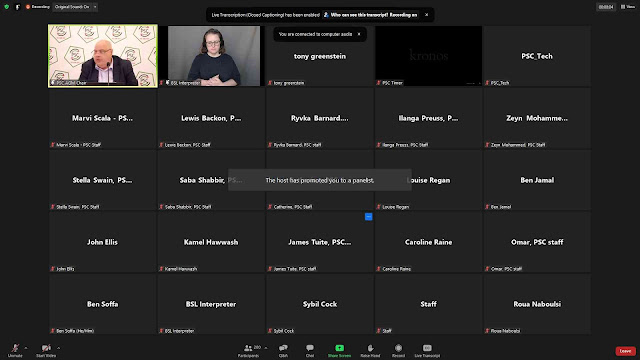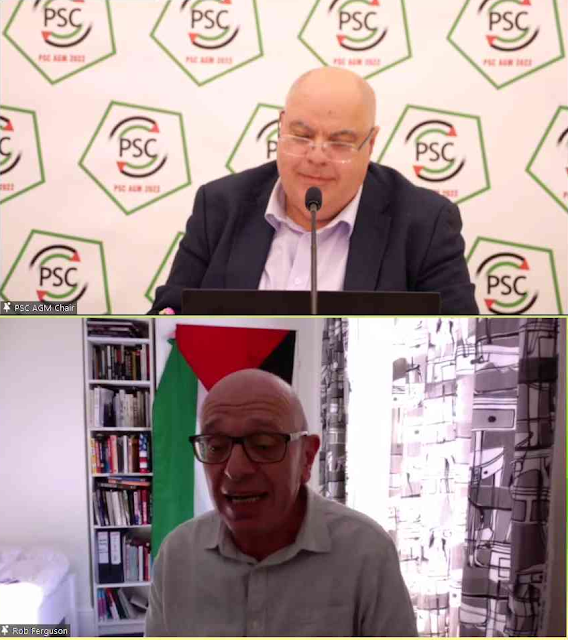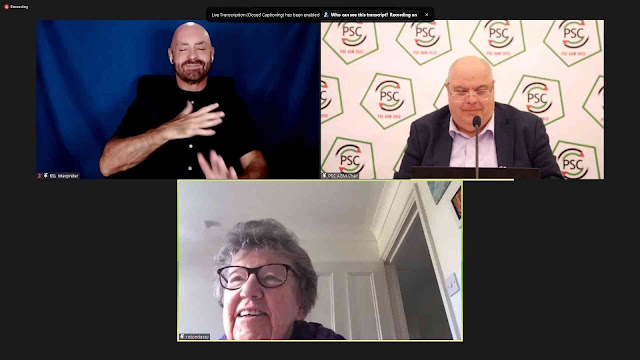A Boy of 17 with autoimmune disease is detained without trial indefinitely – an 80 year old man is beaten, blindfolded and left to freeze to death
If only Amal
Nakhleh had been born Jewish then instead of occupying a cold cell he would be
in an Israeli hospital receiving treatment for autoimmune disease. As it is he
has been classified by the Israeli military and Shin Bet as a threat to Israeli
security and that has meant his being held under Administrative Detention, or
in plain language imprisonment without trial.
Of
course, as even Corbyn accepted, Israel has an independent judiciary. So independent that they have a policy of
never contradicting the army or police when it comes to ‘security’. So that the
obvious injustice and absurdity of an ill 17 year old being a threat to the
settler state’s ‘security’ is never challenged or questioned.
Internment
without trial, as in Ireland, is always the last resort of the occupying
colonial power, except in Israel’s case it is the first resort. It is true that
the case against him was so thin that he was released by 2 Israeli military
judges, in itself highly unusual in a ‘court’ system that convicts 99.7% of
those who come before it. But don’t
worry, such was the threat that this sick boy posed to the mighty Israeli state
that Israel’s Shin Bet, an internal security police and MI5 rolled into one
(very much like the Nazi SD (Sicherheitsdienst)
immediately
locked him up anyway and literally threw away the key.
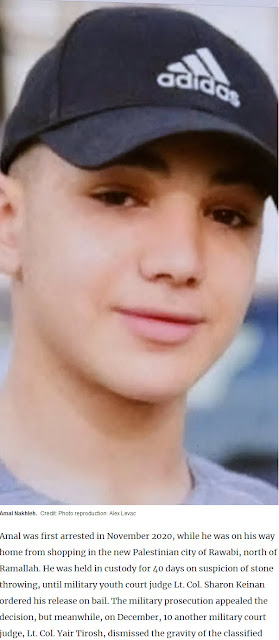
Amal Nakhleh. Credit: Photo reproduction: Alex Levac
Of
course it’s not racist what has happened and if you say it is then you will be
a prime candidate for expulsion from Sir Keith’s Labour Party. Because under
the IHRA
misdefinition of anti-Semitism, calling Israel what it is, a racist state (or
endeavour to use their quaint language), is ‘anti-Semitic.’ It really doesn’t
matter whether or not it is true , the fact is that it is anti-Semitic!
However
we won’t dwell any longer on Amal as he has been born into the wrong tribe and
there really is nothing that can be done about that. One thing is certain. You
cannot change your ‘race’ which is why Israel’s Conversion Authority refuses
on principle to allow Palestinians to convert to Judaism.
This
is much the same as in Nazi Germany where once a Jew always a Jew even if you
converted to Christianity. Hence why that hybrid creature, the Jewish
Christian was born.
Then
there is Omar Abdalmajeed As'ad who
was bound, beaten and tossed to the ground, much as if he was a farm animal.
And here I ask you to sympathise, not with Omar, because he’s dead, but the
soldiers whose treatment led to his death.
You
would have to have a heart of stone not to understand their plight. Normally
when soldiers kill a Palestinian, there is a formal ‘investigation’ (if that’s
the right word) and then the army announce that the soldiers were defending
themselves.
So it was no surprise when a military
report said that none of the troops involved “would be indicted, nor have
they been suspended.”

The building in Jiljilya where Omar Abdalmajeed As’ad died. Credit: Alex Levac
It quoted military lawyers representing the soldiers as saying As’ad had
been “lawfully detained during the
operation in accordance with procedures” and “his death is not related to the conduct of the military force”
But
then news got out that Omar also had dual American citizenship and that is when
things began to go wrong, well not that wrong. The military had then to conduct
a slightly more serious ‘investigation’ which found, under American pressure,
that what happened was ‘serious and
unfortunate’.
Indeed
it was ‘a moral failure and a failure of
judgment and severely harms human dignity” Indeed senior officers told Ha’aretz
that the soldiers “didn't see a human being in front of them”. One might ask
when did the Israeli military see Palestinians as human beings but I refrain
from doing so for fear of being accused of ‘anti-Semitism’.
Strong
words indeed. So strong and serious that one commander will be rebuked, and two
subordinate company and platoon commanders will be immediately dismissed. Of
course there is no question that they will be arrested and charged with murder
or at the very least gross negligence manslaughter. After all
Omar was, when all is said and done, a Palestinian and therefore a threat to ‘security’.
Omar
is dead so there really is no point in crying over spilt milk (or blood). The
soldiers concerned were all haredi, i.e. ultra orthodox and according to the
Talmud, a non-Jewish life is
not worth the same as a Jewish life.
Of
course these ancient rules had long ago fallen out of use before the Israeli
state came on the scene. And then they were resurrected in order to legitimise
Israel’s colonial practices. Because you can’t argue with God can you?
You
will, I hope, sympathise with the poor and unfortunate soldiers. How were they
to know that a Palestinian they were killing had dual nationality? It was not
as if he was carrying his passport. Anyway he didn’t look like an American. He
wasn’t even White. Secondly he didn’t at any stage tell them he was an
American. How were these soldiers to know that? All in all it is an unfortunate
accident.
You
can see, I hope the point I am making. In 99.99% of times no one would have
said anything. Ayelet Shaked, the Interior Minister would have described
them as the ‘salt of the earth’. Prime Minister Bennet would have railed anyone
who dared criticise the ‘defensive
bulwark’ that the IDF provides. This is really a tragedy of immense
proportions.
Because
of an accident of birth and circumstances, three Israelis face having their
futures tarnished. Two have already been dismissed from the army, which is a
disgrace in Israel (although they can expect to be readmitted when the fuss
dies down). Some people, god forbid, not satisfied with this punishment are asking
for their pound of flesh and for them to be brought before a court.
I
am sure you will agree that in the circumstances these young men have already
been punished enough for a mistake that was in no way their fault. And if
anyone suggests otherwise then they too are anti-Semitic, as my good friend,
that friend
of Israeli child abuse, Louise Ellman will confirm.
Fortunately
in Israel we have no problem with this incessant anti-Semitism that is taking
over our lives because as Emily Thornberry once proclaimed Israel is a
‘beacon of light and democracy.’
Below
are 2 articles describing the events above in more detail.
Tony Greenstein
For Over
a Year, Israel Has Jailed a Palestinian Teen With a Rare Disease. There's No
Trial in Sight
Ha’aretz 11.2.22.
Two Israeli military judges have ordered Amal Nakhleh's release, but the
larger predatory system has insisted on keeping
him jailed

Amal
Nakhleh and his father Muammar, during better times.
Credit: Photo reproduction:
Alex Levac
Gideon
Levy, Alex
Levac
Feb. 11,
2022
What do the Shin Bet security service and the Israel Defense Forces have
against a teenager in high school, whose father says he doesn’t know the
difference between ideology and biology, who suffers from a rare autoimmune
disease and who in 2020 underwent surgery to remove a tumor from his chest? Why
do they imprison him repeatedly, without trial, without an indictment, without
any consideration for his age or his health?
No one knows what the suspicions are against Amal Nakhleh, who was in
the 11th grade at the time of his first and second
arrests, whose father is the director
general of a broadcasting company in Ramallah and whose mother is a gynecologist
in the Jalazun refugee camp, near that same city. Not does anyone know how long
the teenager will remain in prison – apparently for stone throwing. Two Israeli
military judges have already ordered
his release after examining the security
information in his case, but the larger predatory system has insisted on
keeping him jailed, and to that end, has issued an administrative detention
order – incarceration without trial; arbitrary and unconstitutional – that is
renewed every few months. That has happened several times so far, and the end
is not necessarily looming on the horizon.
As if his disease and the operation he underwent weren’t enough, last
week Nakhleh also fell ill with COVID-19 and was taken to the hospital in Ramle
Prison. He can’t be vaccinated, because of his immunosuppressive disorder. He
was returned to his cell earlier this week.
Amal will turn 18 next week. His current administrative detention is due
to end in mid-May, though it might be extended again. His father, a Ramallah
resident, is the head of the Wattan Media Network, which employs about 100
journalists. In the organization’s headquarters, high up in an office tower in
the heart of the city, the staff was busy this week preparing a campaign
supporting a one-state solution. In the past, the Israel Defense Forces raided
the company’s offices and studios several times – most recently in 2012 –
carrying off equipment that was never returned.
Muammar Nakhleh, 50, a journalist, lawyer and left-wing activist, has
two children. Osama, now almost 19, was arrested for the first time at the age
of 13 and spend two years of his life behind bars. Amal has now been
incarcerated for a total of 14 months. Their parents are divorced, and the sons
divide their time between their mother, Iman, in Jalazun, and their father, in
Ramallah.
Amal was first arrested in November 2020, while he was on his way home
from shopping in the new Palestinian city of Rawabi, north of Ramallah. He was
held in custody for 40 days on suspicion of stone throwing, until military
youth court judge Lt. Col. Sharon Keinan ordered his release on bail. The
military prosecution appealed the decision, but meanwhile, on December, 10
another military court judge, Lt. Col. Yair Tirosh, dismissed the gravity of
the classified evidence presented to him and also ordered Amal’s immediate
release. On January 21, 2021, however, Amal was rearrested, with no
explanation. A few days later, reserve military court judge Shimon Ashual
approved the request – submitted by Col. Naama Rosen Grimberg, an intelligence
officer in Central Command – to issue a six-month administrative detention
order against Amal.
When Amal was 15, a benign tumor was discovered in his thymus gland,
below the breastbone. A few months later, a Ramallah hospital recommended that
he undergo surgery in Hadassah University Hospital in Jerusalem or in the
city’s St. Joseph Hospital. His father was unable to obtain an entry permit to
Israel for him, but Amal and his father succeeded in getting to the hospital by
other means, and he underwent surgery there.
A few days after being released from the hospital Amal was arrested at
the Atara checkpoint when leaving Rawabi. A few weeks after he was released, a
Palestinian intelligence official called his father and told him to report to
them urgently with his son. Muammar Nakhleh said he would produce his son the
following day. Two hours later, Palestinian intelligence called again: “Where
are you? Get here immediately. The Israelis are going to kidnap Amal.” Amal was
then questioned by Palestinian investigators. He was asked about stone throwing
at the Beit El settlement and about some of his Facebook posts, and was freed
after an hour. That same night, Israeli troops arrested Amal at his mother’s
home in Jalazun. Since January 21, 2021, he has been in prison.
Amal told his father that he was incarcerated because of his “biological
thoughts.” Muammar says he meant his “ideological thoughts.” This week, in his
Ramallah office, Muammar mentioned the confusion on his son’s part several
times. “He is too childlike to be arrested for dangerous thoughts.”
Amal suffers from a rare autoimmune disease called myasthenia gravis,
which affects the connections between muscles and nerves, and can sometimes
affect muscles used for breathing and also the limbs. The disease is connected
to the tumor in the thymus gland for which Amal had surgery. It’s a chronic,
incurable disease, and he requires medicative treatment and constant
monitoring.

Muammar Nakhleh, Amal's father, in his office at the Wattan Media
Network in Ramallah. "Amal is too childlike to be arrested for dangerous
thoughts,” he says.Credit: Alex Levac
Dr. Bettina Birmans, a neurologist at Shaare Zedek Medical Center in
Jerusalem, examined Amal on June 14, 2021, in Ofer Prison, at the request of
the family and the NGO Physicians for Human Rights. She reported that Amal
complained of shortness of breath while walking, apparently due to his illness,
and recommended an urgent CT scan, because, she wrote, “a considerable
possibility exists that there is a malignant growth and precious time should
not be wasted.” The scan was carried out on July 22, at Hadassah, and happily
no evidence of tumor recurrence was found, as the radiologist, Prof. Dorit
Shaham, wrote. According to Amal’s father, stressful situations are harmful to
his son’s condition, and cause him to have trouble eating and breathing. His
ocular muscles are also affected.
Joint List MKs Aida Touma-Sliman and Ofer Cassif tried to obtain Amal
release, due to his condition, via Defense Minister Benny Gantz, and also
attempted to ensure that he was receiving his medications. On September 22,
2021, Cassif sent a message to Gantz urging Amal’s release “in light of his
medical condition and the danger to his health in conditions of incarceration.”
To no avail. His parents worried that he’d contract the coronavirus since he is
unvaccinated, and are concerned in general that the tumor will recur. When he
indeed fell ill with the virus and was hospitalized in the Ramle Prison, MK
Touma-Sliman inquired about his condition in the defense minister’s bureau, as
Amal’s parents had no way to communicate with him; she was told he was in good
condition. Amal, it bears noting, is still a minor, until next week.
There’s no way of knowing whether he will be released when his current,
fourth term of administrative detention ends on May 18. Requests for his
release by Palestinian and international human rights groups have also been
rejected. “We are holding him for security reasons,” was the response they got.
Every attempt to find out what security dangers justify such a lengthy,
arbitrary detention, why this high-schooler is not being placed on trial if he
is so dangerous, and what will become of these dangers when he is released one
day – all these questions have gone unanswered. Indeed queries like those never
get a response in cases of administrative detention, even when minors are
involved.
The IDF Spokesperson’s Unit this week responded to Haaretz’s query on
the subject as follows: “Amal Nakhleh was arrested by the security forces on
suspicion of involvement in terrorist activity. After information was collected
about him which showed involvement in military activities, dealings with
weapons and participation in public terror activities, an order for his
administrative detention was issued that was extended from time to time in
light of his danger to the region’s security. The present detention order is
valid until May 2022. All the orders, including the present one, were examined
and authorized by the military court.
“In the deliberations relating to the judicial review of administrative
detention, the court examines all the pertinent data in the matter, including
every medical document presented to it, and weighs medical and other
circumstances within the framework of its decision. We cannot comment on the
data here, for reasons of personal privacy, and because the deliberations are
held in camera.”
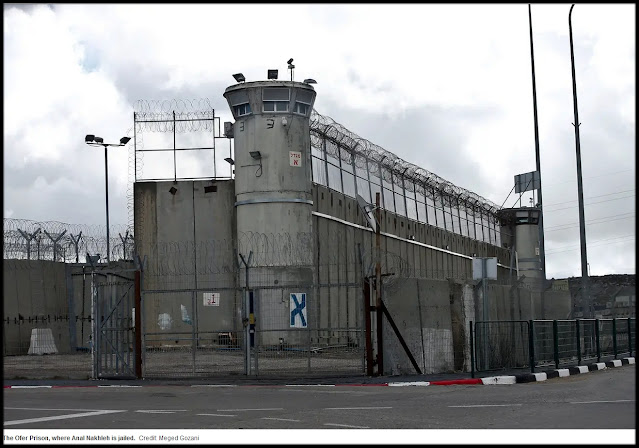
The Ofer
Prison, where Anal Nakhleh is jailed. Credit: Meged Gozani
If the suspicions are indeed so grave, one must ask: Why has this young
man not been put on trial?
Amal took his high-school matriculation exams in prison. He was supposed
to enter university in the fall. At first, he wanted to study communications,
but his father persuaded him to major in political science. “If you have
something against him – tell us, tell his lawyer,” Muammar tells us. Iyad
Hadad, a friend of the family and a field researcher for the Israeli human
rights organization B’Tselem, adds, “Especially given his age and his medical
condition.”
Amal – “hope” in Arabic – was so named when he was born preematurely, in
the sixth month of pregnancy. The physicians told his parents that he wouldn’t
survive but asked his father to give him a name nonetheless, for the death
certificate they would issue. Muammar didn’t hesitate for a second, and named
him Amal. Muammar, by the way, is named for Muammar Gadhafi, the former
president of Libya; his brothers, too, have the names of Arab leaders.
Amal played on the Palestine children’s soccer team, and before his
arrest was set to travel to South Korea with the team. His dream was to get to
Barcelona; his hero is Lionel Messi. “His model is not his father or his
mother, it’s Messi,” his father says.
Muammar admits that he is not optimistic about his son’s release in May,
because when deciding on the last extension the authorities did not specify
that it would be the last one. Last week the father was supposed to visit his
son in prison, but the visit was canceled in the wake of Amal’s hospitalization
with the coronavirus. During the year in which the young man has been
imprisoned, Muammar has been permitted to visit him only twice.
On Sunday this week, Muammar met another youth from the Jalazun refugee
camp who was incarcerated with Amal and was released. The teenager told him
that Amal speaks to God and asks why he disappoints him time after time.
Details
still emerge weeks after Israeli troops violently arrested an 80-year-old
Palestinian. Omar Abdalmajeed As'ad was bound, beaten and tossed to the ground.
An autopsy found that the brutality he suffered resulted in a fatal heart
attack, but arrests are yet to be made
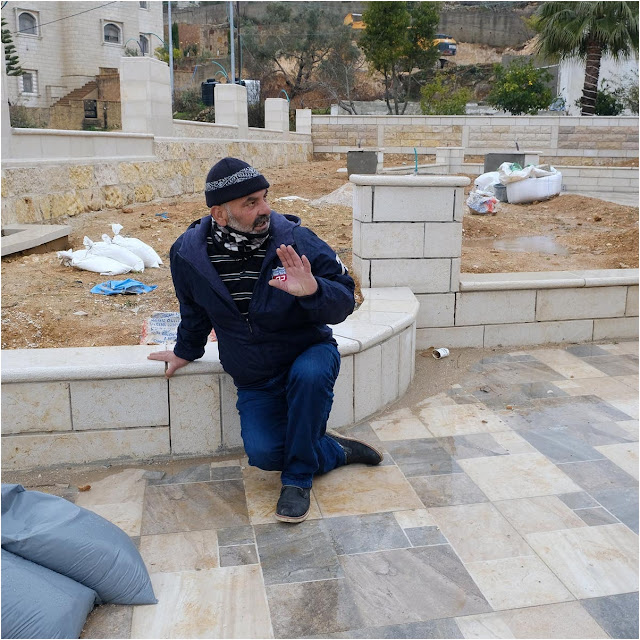
Mamduh Abd A-Rachman, one of the other
Palestinians brought to the site where Omar As’ad lost his life. “We’ll all
die,” As’ad’s brother says. “But why like that?”Credit:
Alex Levac
Gideon
Levy, Alex
Levac
Jan. 28,
2022
It was a few minutes after 3 A.M. Omar Abdalmajeed
As’ad was driving from the home of a friend on the western side of his village
to his house, on the eastern side. A few hours earlier he had dropped off his
wife at home after they’d gone shopping together and had coffee with friends.
At around 10 P.M. he went to visit a friend. Since returning from the United
States, 11 years ago, As’ad had been spending a lot of time with childhood
friends from the village. They sipped coffee, played cards and talked late into
the night, each time at someone else’s house. The night of January 12 was no
different. At 3 A.M. he drove home.
On the dark, empty road, he suddenly noticed a few
Israel Defense Forces soldiers at the street corner where Ali’s Grocery is located,
in the center of town. Jiljilya, located in the Ramallah District and one of
the most affluent locales in the West Bank, is replete with palaces. Some of
its residents immigrated to the United States years ago, where they prospered
and then built themselves mansions back home. A drive around affords quite a
spectacle: Houses of marble that look like they’re made of marzipan, each more
luxurious than the next, most of them empty, awaiting their owners’ family
visits in the summer, or waiting for them to retire.
Omar and his wife Mahani also wanted to grow old
together in their village, after they left it for America in 1970. For the
first 11 years they lived in Chicago, then they moved to Milwaukee, where they
owned a few supermarkets. Mahani is 78, Omar was 80, and they were married for
58 years. They built their home in Jiljilya 15 years ago – a relatively modest
residence compared to most of the other neighboring villas. They lived there
alone: Their five daughters, two sons and their grandchildren remained in
America. Everyone in the family, including the grandparents, has U.S.
citizenship.
It was very cold, that Wednesday night. The
soldiers ordered As’ad to stop. The previous night, too, IDF jeeps
had invaded Jiljilya, which is typically one of the quietest locales in the
West Bank. Maybe that’s why the fighters from the army’s ultra-Orthodox Netzah Yehuda
(“Judah’s Eternity”) Battalion 97 raided it: It’s easy to train, to mete out
abuse for no reason, to demonstrate control and power, or just enjoy a break
from the routine and the boredom there. This ludicrously named battalion has a
rich record of acts of abuse against Palestinians. This time it was the turn of
the inhabitants of Jiljilya.
The forces decided to detain without prior warning
anyone who dared drive in the street that night. The soldiers claimed
afterward, in testimony they gave to the army, that this was the order they had
received – from whom it isn’t clear. According to residents, dozens of troops
descended on the village that night; five to seven of them manned a makeshift
checkpoint they’d erected in town.
An eyewitness, Rada Bakri, 63, who lives above the
site where the soldiers positioned themselves, was awake and had read in the
social networks that the army had invaded again. He peeked out of the window of
his second-floor apartment – according to an account he later gave to Iyad
Hadad, the Ramallah District field researcher for the Israeli human rights
organization B’Tselem – and saw a few soldiers leap into the middle of the road
and stop As’ad’s car. Shouts quickly erupted between them and the elderly man
who wanted only to get home.
After about five minutes a soldier opened the door of
the vehicle and forcibly removed the driver, according to Bakri. The soldiers
shackled his hands with black plastic handcuffs, later found at the place where
he died, blindfolded him and stuffed pieces of flannelette into his mouth.
About 120 meters separate the spot where As’ad was
initially detained and the place where the soldiers force-marched or dragged
him. That occurred along the dirt path that leads to the new mansion of
Mohammed As’ad, a relative of Omar’s, who also returned, in his case recently,
from the United States and is living in Ramallah until his luxurious two-story
home will be ready – very soon now. Soldiers had wandered about near the empty
structure the night before; on this night they would haul five Palestinians
into its marble-floored courtyard.
It was very dark, and eyewitness Bakri still can’t say
whether As’ad walked on his own or was dragged by force. As’ad was a heavyset
man with a plodding walk, his family related early this week when we visited.
They found one of his shoes in his car – meaning that if he was walking, it was
with one foot exposed to the wet, cold earth. They added that the soldiers had
subjected him to a body search: He was left without a coat, wearing only a
shirt and sweater; they stripped off his red keffiyeh, which was found later in
a corner of the courtyard.
As’ad would have passed through the stone gate into
the courtyard of the imposing new house, with its red-tiled roof and stone
pillars in front. There, the soldiers threw him onto the ground, face-down,
like one would toss a sack, next to the bags of sand being use in the
construction, which are still there. Hadad believes that As’ad died within a
short time, perhaps soon after he was hurled to the ground. An 80-year-old man
on a frigid night, frightened, humiliated, probably panicked. “Why didn’t they
at least allow him to sit, bring him a chair?” mourners asked this week, in the
family’s house.

The path down which Omar Abdalmajeed As’ad was dragged or force-marched
by Israeli troops.Credit: Alex Levac
In the meantime, a van approached the soldiers’
checkpoint at the bottom of the road, carrying two Palestinian greengrocers who
were on their way to the wholesale market in the town of Beita. It was about
3:30 A.M. Mamduh Abd A-Rachman, 52, from the nearby village of Arurah, was in
the passenger’s seat. This week he accompanied us to the site where As’ad was
taken that night – followed by him and his colleague – in order to reconstruct
the elderly man’s last moments.
The soldiers stopped the van and ordered the driver to
proceed to the mansion, where the two occupants were told to get out and hand
over the keys and their ID cards. They were forced to sit in the courtyard; Abd
A-Rachman showed us how he sat on his leg, because the marble was unbearably
cold. The two newly snared captives were ordered to sit a few meters apart.
They weren’t handcuffed, but a soldier trained his weapon on them. They were
told to keep their eyes on the ground. They couldn’t see anything. On the way
from the van, Abd A-Rachman said he tried to tell the soldiers that he was ill,
but that of course was of no interest to them; they forced his head down and
ordered him to shut up.
A large number of soldiers had meanwhile gathered in
the courtyard, which had become a temporary detention facility. A few minutes
later, two more Palestinians were brought in, also greengrocers on their way to
Beita. They too were made to sit on the ground and keep their eyes down. The
detainees were seated a few meters apart, apparently to prevent them
from mounting an uprising. One of the soldiers now drove As’ad’s car, which had
remained at the checkpoint, to the mansion.
And thus they sat, on the cold floor – four living
detainees with eyes downcast and one who was most likely dead by that time.
They were drowsy and freezing; Abd A-Rachman fell asleep. The four didn’t know
that someone had been brought there before them. Abd A-Rachman recalled that at
one point he felt that he was touching something, but never imagined it was a
dead body, thinking it was one of the bags of sand scattered about. A short
time later, two soldiers sat down near Abd A-Rachman. Afterward it would emerge
that they had come to remove As’ad’s handcuffs: Apparently they realized he was
dead and wanted to get out as fast as possible, while eliminating any evidence.
An
autopsy performed this week by three Palestinian physicians, under
the auspices of the Palestinian Authority, revealed that As’ad, who had
pre-existing health problems, died as a result of a heart attack. The examiners
noted that he had received blows to the head and arms and that the blindfold he
wore was so tight it caused bleeding. They determined that the reason for death
was “a sudden cessation of myocardial activity due to psychological tension
brought on by the external violence to which he had been exposed.” Another
source added that the initial autopsy findings suggested that As’ad was
“severely beaten” and suffered from “rough and violent treatment” – as
evidenced by numerous bruises.
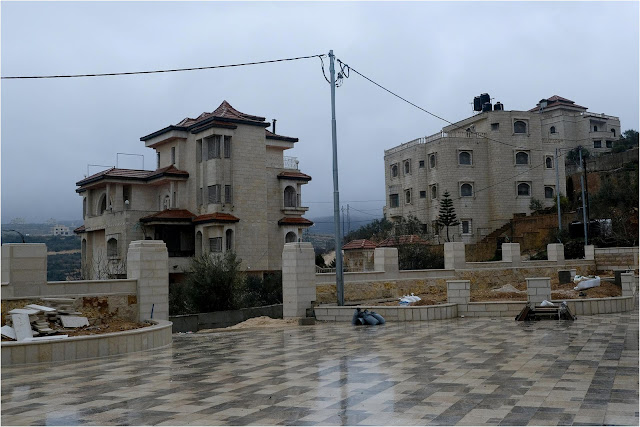
The area where Omar Abdalmajeed As’ad's body was found, in Jiljilya.Credit: Alex Levac
The IDF Spokesperson’s Unit issued the usual statement
this week: A Military Police investigation is now underway. A spokesperson for
Military Defense, which is representing the soldiers, stated: “They [the
soldiers] were engaged in operational activity with the aim of preventing
terrorism. The Palestinian in question was detained lawfully during the
activity in accordance with procedures, in light of his behavior, which
endangered the soldiers and the force, and he was released at the conclusion of
the activity in sound condition and with no need for medical intervention. The
circumstances of his death are not related to the conduct of the military
forces.”
While retreating from the courtyard, the soldiers
aimed their rifles at the detainees. Abd A-Rachman says he got up to ensure
that they were indeed gone, and then noticed something covered up next to him.
He was aghast to discover it was a human body. As’ad’s face was covered with
some sort of cloth, perhaps the coat he had been stripped of. Abd A-Rachman remembers
that he shouted that there was a body, but the others replied that it was
probably a sack of cement. “No, it’s a person!” he screamed.
A check of the man’s pulse and breathing revealed that
he was lifeless. Within a few minutes the village doctor, who lives several
dozen meters from the site, arrived and tried to resuscitate As’ad, but in
vain. The group then carried him on a stretcher to the physician’s clinic and
administered electric shocks, but to no avail. As’ad was dead. It was 4:09 A.M.
The soldiers left the ID cards and car keys they had confiscated on the roof of
As’ad’s car, it was later discovered.
In her home in Milwaukee, As’ad’s daughter, Hiba, 32,
read on social media that someone from her parents’ village had died. She
called the house immediately. Mahani, her mother, awoke in a fright. This week
the widow told us tearfully that she was sure her daughter was calling because
she had quarreled with her husband. But Hiba asked where her father was. The
devastating answer came soon enough. Now Mahani is sitting in her living room
in a traditional black dress and weeping. The family has already hired a
caregiver for her, as she remains alone in the house.
Two days before As’ad’s death, his younger brother
Amer, a 59-year-old gardener with an American accent who lives in Racine,
Wisconsin, had arrived in Jiljilya. He hadn’t seen his brother since As’ad left
the United States over a decade beforehand and now he had come to visit. Unlike
him, As’ad’s children didn’t manage to get to the funeral; since they don’t
have Palestinian ID cards, they had to request Israeli visas, which are
extremely hard for Palestinians to get.
Since their return, Mahani and Omar had been unable to
leave the village: Their old ID cards had been confiscated due to their prolonged
absence; even if they had somehow traveled abroad with their U.S. passports,
they would not have been allowed to return. Shortly before we arrived this
week, the new ID cards they had waited for all these years arrived – but Omar
was no longer alive. Amer had only managed to see him briefly before he died.
Mother and brother are sobbing now. “We will all die,”
the brother says. “But why like that?”
PA officials say Palestinian-American Omar
Abdalmajeed As'ad, who previously lived in Wisconsin, had a heart attack after
being bound and beaten by Israeli soldiers; the IDF says he had been released
much earlier
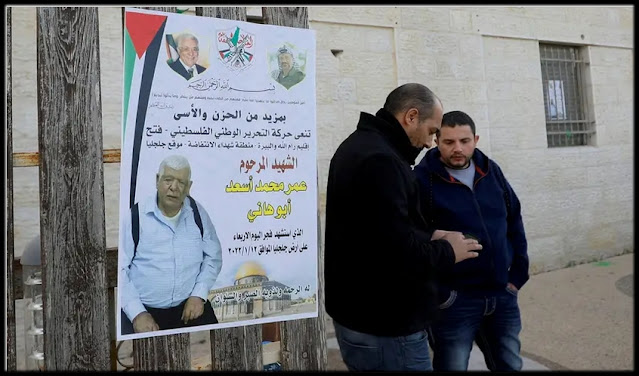
Men stand next to a poster of Palestinian
Omar Abdalmajeed As'ad, 80, in Jiljilya village in the West Bank, on Wednesday.
Credit: MOHAMAD TOROKMAN/ REUTERS
Ben
Samuels
Ha’aretz Jan.
15, 2022
U.S. lawmakers are demanding a thorough investigation
into the death of an 80-year-old Palestinian-American resident of the West Bank
after he was detained by Israeli soldiers.
Palestinian officials say
Omar Abdalmajeed As'ad, who previously lived in Milwaukee, was
pulled from his car by Israeli forces on his way home in the village of
Jiljilya. They allege that the soldiers bound, blindfolded and beat As'ad, who
then succumbed to a heart attack in the early morning Wednesday.
As'ad's body was found more than an hour later,
according to vegetable seller Mamdouh Elaboud, who said he was himself detained
for 20 minutes, then released.
The Israeli military confirmed he had been held
by soldiers "after resisting a security inspection," but said he
was then released and only later, in the morning, found dead near his village.
Israel's military police have launched an investigation into the incident.
Sen. Tammy Baldwin, who
represents As'ad's state of Wisconsin, called the incident a
"horrible tragedy that demands a thorough investigation." She
extended her condolences to his family, "including those in Wisconsin who
are mourning this tragic loss and deserve answers."
Rep. Rashida
Tlaib, the lone Palestinian-American serving in Congress, called the
circumstances leading to As'ad's death “outrageous” and urged U.S. Secretary of
State Antony Blinken to investigate.
Rep. Ilhan Omar shared an Instagram Story regarding
the incident, posting "Life taken under the cruelty of occupation. When
will these victims get accountability?"
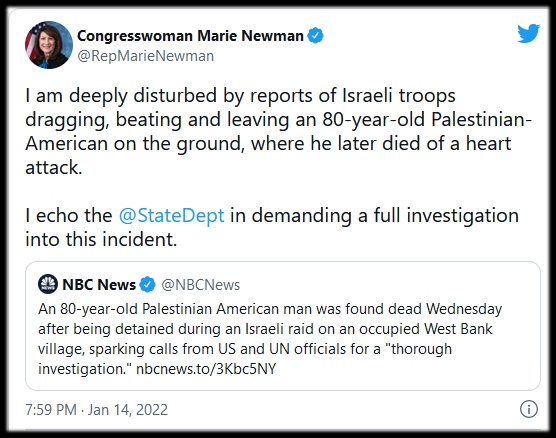
Rep. Betty
McCollum, long one of Congress' more outspoken critics of Israel's
treatment of Palestinians, called As'ad “another victim of this cruel
occupation,” and Rep. Marie Newman, the first-term lawmaker who has quickly
fashioned herself into a leading advocate for Palestinians, said she was
“deeply disturbed” and echoed the State Department's support of an
investigation into the death.
Rep. Debbie Dingell joined the call for a full and
thorough investigation, called the circumstances surrounding his death “gravely
concerning.”
The lawmakers' demands come days after State
Department spokesperson Ned Price confirmed the United States has been in touch
with Israel about As'ad's death.
"We've been in touch with the government of
Israel to seek clarification about this incident, [and] the Israeli Defense
Forces have indicated there's an ongoing investigation into the matter. And we
support a thorough investigation into the circumstances of this incident,"
Price said.








